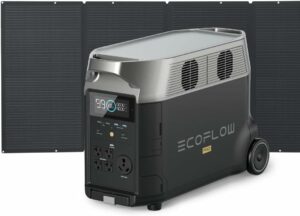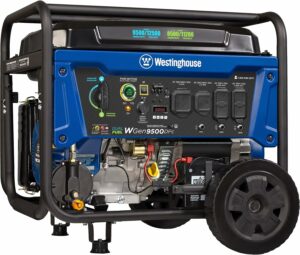Stay Prepared with the Best Home Generator for Power Outages
Power outages can strike anytime, disrupting our daily routines and leaving us vulnerable to darkness and inconvenience.
In such situations, having a reliable backup power source is essential to maintain a sense of normalcy and safety.
Home generators have emerged as a dependable solution to combat power outages, providing uninterrupted electricity to keep essential appliances running.
This article will explore the significance of staying prepared with the best home generator for power outages.
We will delve into key considerations when choosing a generator, examine the top features of the best models on the market, hear from real homeowners who have benefited from their generators, and address safety precautions and guidelines.
By the end, you’ll have a credible understanding of why a home generator is an invaluable investment for preparedness.
Provo Green Products embodies a beacon of trust in the realm of sustainable discoveries, offering choices that enhance your life and leave a positive mark on our planet.
Leveraging extensive expertise in manufacturing, construction, and various trades, we provide a solid foundation for sustainable living.
Our meticulous research process guarantees that our information about each product is precise and current, allowing you to make informed decisions.
Whether your interest lies in solar products, electric bikes, or other eco-friendly alternatives, our commitment to credibility ensures you have access to dependable insights, guiding your journey toward a more sustainable lifestyle.
Provo Green Products is your go-to destination for finding the right green products for your lifestyle.
Disclosure: As an Amazon Associate I earn from qualifying purchases. This does not affect the product pricing whatsoever.
Understanding Power Outages
Before delving into the importance of home generators, it is essential to grasp the impact of power outages on our lives.
Power outages can occur for various reasons, such as severe weather events, utility failures, equipment malfunctions, or accidents.
During these disruptions, our homes lose access to electricity, affecting lighting, heating or cooling systems, refrigeration, and the ability to charge essential devices like phones.
Additionally, power outages can compromise security systems, medical devices, and communication services, making preparedness all the more critical.
Key Considerations for Choosing a Home Generator
When selecting the best home generator for power outages, several crucial factors must be considered.
Firstly, it’s essential to calculate your power requirements to determine the generator’s capacity needed to support your essential appliances.
A professional electrician can help assess your power needs accurately.
Secondly, the fuel type plays a significant role in a generator’s performance, with options including gas, propane, diesel, and solar generators, each with advantages and drawbacks.
Gas generators, for example, are readily available and offer a lower upfront cost, but they may not be as fuel-efficient as propane generators.
Propane generators are cleaner-burning and emit fewer emissions, making them an eco-friendly choice, but propane can be more expensive and less readily available in some regions.
Diesel generators are known for their fuel efficiency and long-term durability but may have higher maintenance costs.
Solar generators are perfect for the environment, but you must ensure you get enough sun in your area.
Therefore, understanding the pros and cons of each fuel type can help you make an informed decision.
Lastly, portability and ease of use should be noticed, as a generator that can be easily transported and started ensures convenience during emergencies.
Portable generators with built-in wheels and handles allow for easy movement to different areas of your property.
In contrast, standby generators can be permanently installed and connected to your home’s electrical system, automatically turning on during power outages.
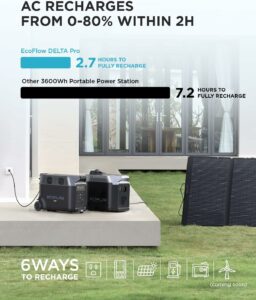
Top Features of the Best Home Generators
The best home generators have essential features that make them reliable and user-friendly.
Automatic start is a crucial feature that enables the generator to kick in automatically when the power goes out, ensuring a seamless transition.
This feature is especially valuable if you’re away from home during an outage or if the outage occurs while you’re asleep.
Low noise levels are also important, as quieter generators prevent unnecessary disturbance, especially in residential areas.
Many modern generators are designed with advanced sound-dampening technology, making them quieter than older models.
This feature is particularly advantageous if you live in a neighborhood with noise restrictions or want to avoid disturbing your neighbors during extended power outages.
Safety mechanisms are another essential aspect of the best home generators.
Overload protection ensures that the generator isn’t overwhelmed by high-demand appliances, preventing damage to the generator and potential hazards.
Automatic shutdown in case of fuel leaks or other malfunctions adds a layer of safety, protecting your property and loved ones.
Furthermore, modern technology has further enhanced home generators.
Some models offer remote monitoring, allowing you to check the generator’s status and performance from your smartphone or computer.
This feature provides peace of mind, as you can monitor the generator’s functioning while away from home.
Smart integration with home automation systems is another advanced feature that enables seamless control and integration of the generator into your smart home setup.
Pros and Cons of Owning a Home Generator
While home generators undoubtedly offer numerous advantages during power outages, weighing their pros and cons before investing is essential.
The primary benefit of owning a home generator is the peace of mind of knowing you won’t be left in the dark during emergencies.
A reliable backup power source ensures that essential appliances like refrigerators, heating systems, and medical equipment remain functional, reducing potential risks and inconveniences during outages.
Moreover, home generators provide a sense of security, especially in regions prone to frequent power outages due to weather events or unreliable utility grids.
They can also be a significant asset for businesses, as they can help prevent financial losses during extended power disruptions, allowing operations to continue as usual.
On the other hand, the initial cost of purchasing and installing a home generator can be relatively high, depending on the model and its power capacity.
Standby, permanently installed generators tend to be more expensive than portable generators.
Additionally, ongoing maintenance and fuel costs should be factored into the overall investment.
Regular maintenance by a certified technician is essential for standby generators to ensure optimal performance and longevity.
This maintenance includes periodic oil changes, filter replacements, and inspections of electrical components.
Although some portable generators are relatively easy to maintain, they may still require occasional servicing to keep them in good working condition.
Fuel costs are another consideration, as running a generator, especially during extended outages, can consume significant fuel.
Propane and diesel tend to have higher costs than natural gas, so the availability and prices of these fuels in your area should be considered when selecting a generator.
Lastly, some homeowners may need help to justify the expense for rare power outages.
If you live in an area with infrequent or short-lived outages, the upfront cost of a home generator may seem less justifiable.
However, it’s essential to consider the potential risks and inconveniences that a single significant outage can cause.
Having a generator at your disposal during such an event can significantly improve your quality of life and ensure your family’s safety and well-being.
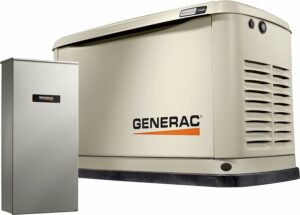
Installation and Maintenance Tips
Proper installation and regular maintenance are crucial to ensure that a home generator operates efficiently when needed.
Homeowners should engage a professional electrician experienced in generator installations to ensure compliance with local regulations and safety standards.
Installing a home generator involves connecting it to your home’s electrical system, which requires expertise and precision to avoid potential hazards.
During installation, the electrician will assess your home’s electrical load and install an automatic transfer switch (ATS).
The ATS monitors the power supply and switches the generator on automatically when it detects an outage, ensuring a seamless transition to backup power without any manual intervention.
Routine maintenance is essential for the reliable performance of your home generator.
Many manufacturers provide detailed maintenance schedules and guidelines in the user manual.
Regular maintenance typically includes changing the generator’s oil, replacing air and fuel filters, checking the battery, and inspecting electrical connections.
It’s crucial to adhere to the manufacturer’s maintenance intervals and procedures recommendations.
Regular maintenance ensures the generator functions optimally and extends its lifespan, reducing the likelihood of unexpected breakdowns.
Real-Life Testimonials: Homeowners’ Experiences
To showcase the real-life impact of home generators, we reached out to homeowners who have experienced power outages and relied on their generators.
John and Sarah, residents of a storm-prone area, shared how their home generator allowed them to continue working from home during extended outages, thanks to its automatic start feature.
“The generator provided security and normalcy during severe storms when power outages were common. It ensured we could continue with our daily routines and stay connected, even when the neighborhood was left without electricity,” said John.
Additionally, Kelly, a mother of two, shared how her generator kept the lights on and her children entertained during a recent power outage, making the experience less stressful for the entire family.
“Having a home generator was a game-changer for us. We didn’t have to worry about our food spoiling in the refrigerator, and our kids were happy to have their devices charged and the Wi-Fi working even when the power was out. It made a difference in how we handled the situation,” she said.
These real-life testimonials demonstrate the practical benefits of owning a home generator.
It’s not just about providing power during outages; it’s about creating a sense of security and stability during uncertain times.
Home generators have proven invaluable assets for homeowners, enhancing their preparedness and ability to cope with unforeseen emergencies.
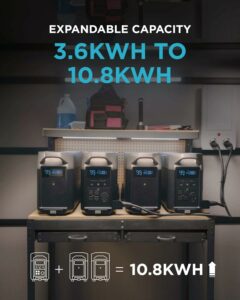
Safety Precautions and Guidelines
Operating a home generator requires careful attention to safety to prevent accidents and injuries.
While generators are designed with safety features, improper usage can lead to dangerous situations.
Following the manufacturer’s installation, operation, and maintenance guidelines is crucial to ensure safe use.
- Proper Placement: When setting up a portable generator, it should be placed outdoors in a well-ventilated area, away from doors, windows, and vents. The generator should never be operated indoors or enclosed spaces, as carbon monoxide buildup can be hazardous and even fatal.
- Fuel Storage: Store fuel for the generator in approved containers, away from heat sources and open flames. Gasoline, propane, and diesel are flammable and should be cautiously handled.
- Electrical Connections: Ensure the generator is correctly connected to appliances or your home’s electrical system following the manufacturer’s instructions. Avoid overloading the generator’s capacity to prevent damage and potential safety risks.
- Maintenance Checks: Regularly inspect fuel lines, electrical connections, and other components for any signs of damage or wear. Promptly address any issues and consult a professional if needed.
- Grounding: Properly ground the generator to reduce the risk of electric shocks and to ensure safe operation.
- Keep Children and Pets Away: Home generators should be kept out of reach of children and pets to prevent accidents.
Conclusion
In conclusion, staying prepared with the best home generator for power outages is a responsible step toward safeguarding your home and loved ones during unforeseen emergencies.
Power outages can strike without warning, but with a reliable generator, you can continue your daily routines and ensure the safety and comfort of your household.
By considering key factors when selecting a generator, understanding its top features, and adhering to safety guidelines, you can confidently invest in a home generator that will be your lifeline during power outages.
So, don’t let darkness and uncertainty overwhelm you; stay prepared with a credible home generator for a brighter and more secure future.
The peace of mind and convenience that a home generator provides make it a worthwhile investment, ensuring that you and your family can weather any storm that comes your way.
Remember to consult with a reputable electrician for installation and maintenance, and take the time to research different generator models to find the best fit for your needs.
With a home generator in place, you’ll never have to worry about power outages disrupting your life again.
Stay in Touch!
I’am a dedicated entrepreneur with many years of experience and an integrity-driven individual who is highly motivated to succeed. Leveraging extensive expertise in manufacturing, construction, and various trades, we can provide a solid foundation for sustainable living. Our meticulous research process guarantees that our information about each product is precise and current, allowing you to make informed decisions. A deep understanding of business operations empowers me to consistently implement improvements that result in ongoing success. Visit site.

